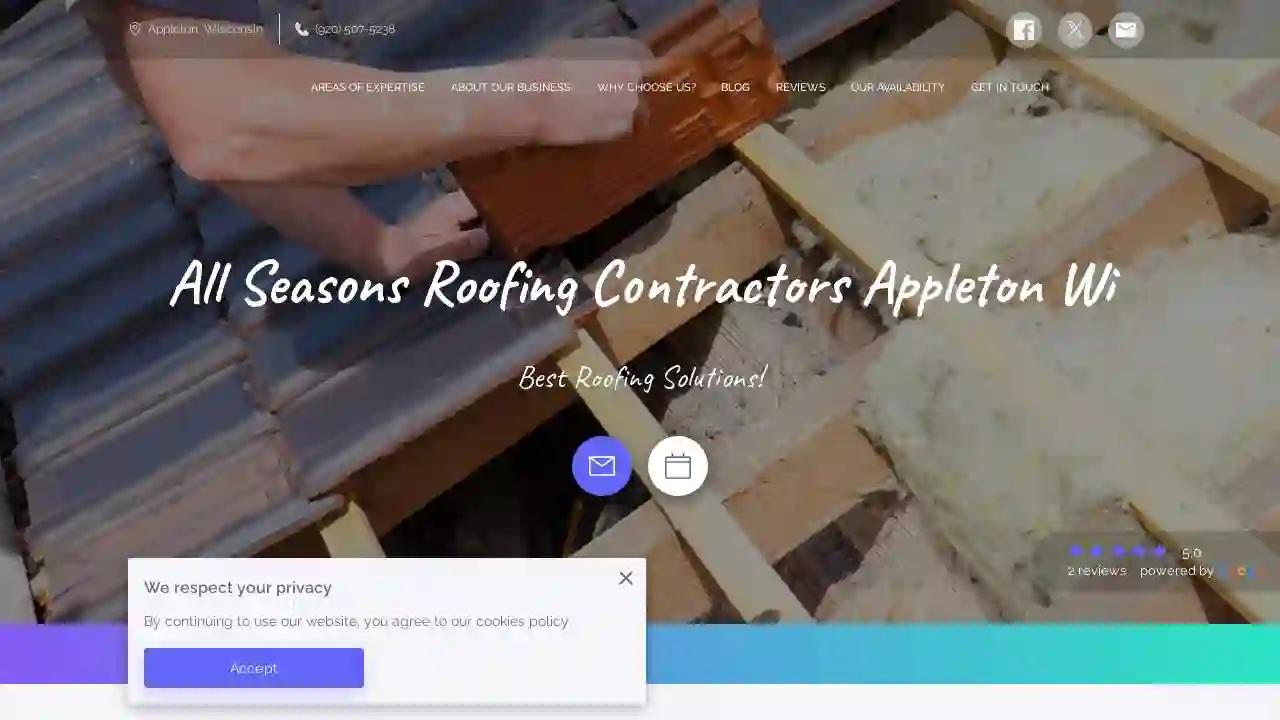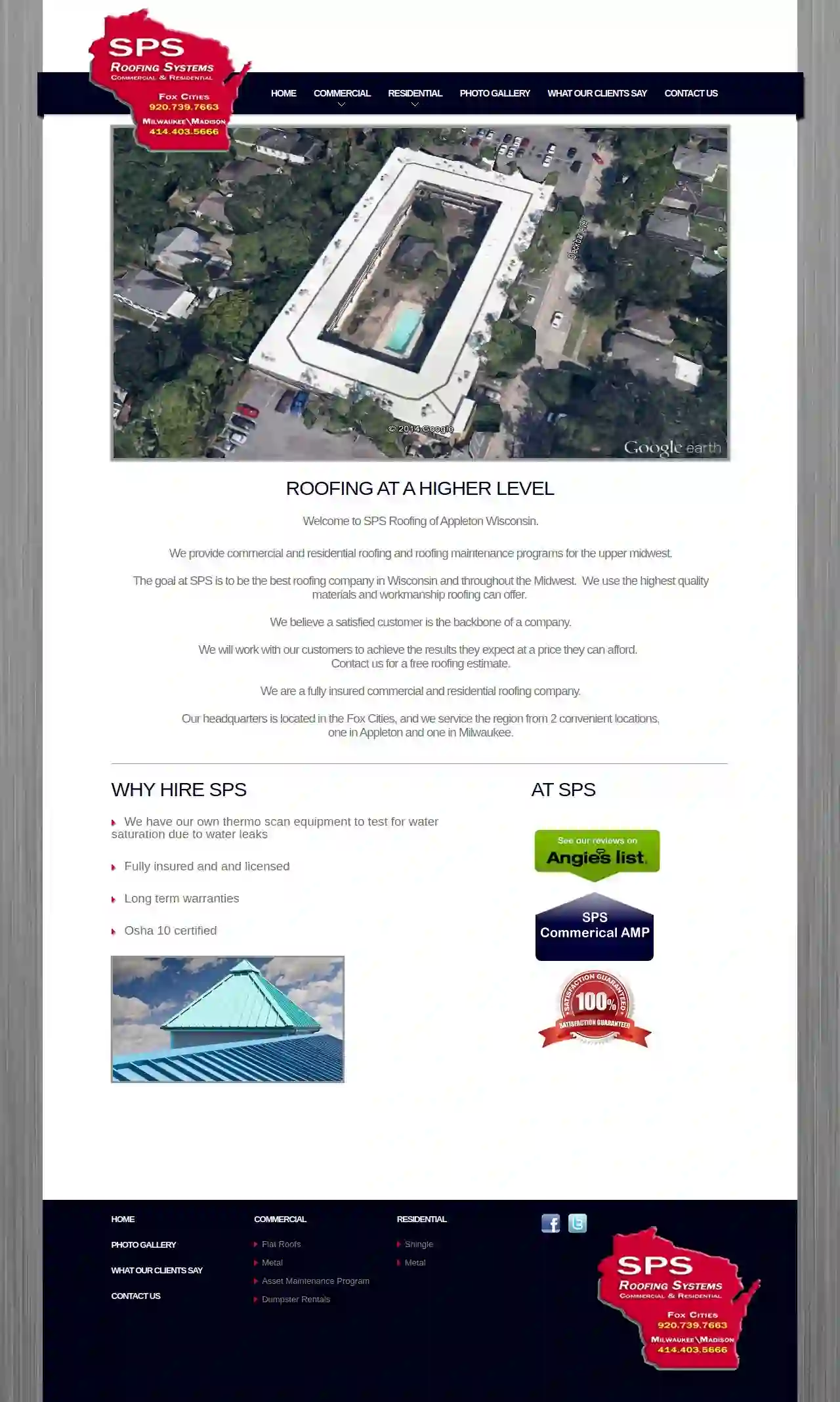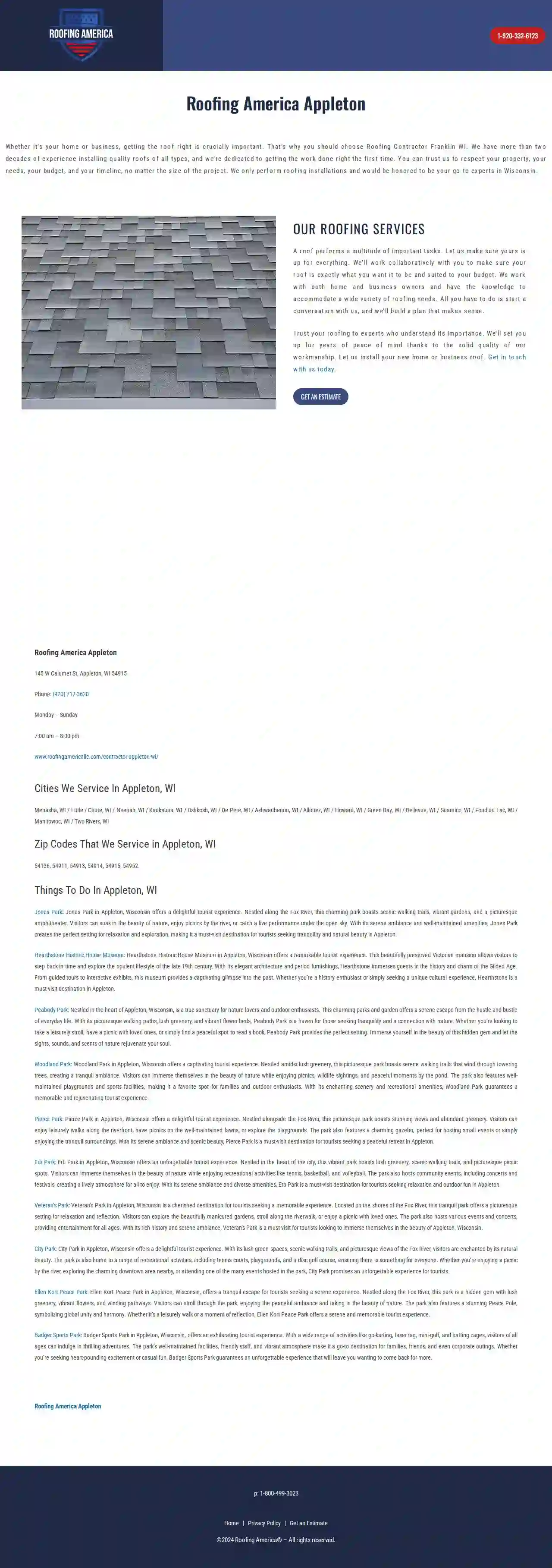Cedar Shake Roofers Appleton
Find Cedar Shake Roofing in Appleton
Get up to 3 Wood Shake Roofing quotes for your project today! Compare profiles, reviews, accreditations, portfolio, etc... and choose the best deal.

DuraShield Roofing & Contracting
4.878 reviews9057 Clayton Ave., Neenah, 54956, USDuraShield Group Inc. is a roofing company that specializes in asphalt, cedar shake, metal, slate, and tile roofing. We are committed to providing high-quality roofing services to our customers in Appleton, WI, and surrounding areas. Our team of experts has years of experience in the roofing industry and is dedicated to ensuring that our customers receive the best possible service. We are fully accredited and insured, and we offer a wide range of services, including roof inspections, repairs, and replacements. We are also proud to be a part of the community and are committed to giving back to our customers and the community through our charitable efforts.
- Services
- Why Us?
- Accreditations
- Gallery
Get Quote
800 Roof Pro
432 reviewsW5068 Amy Ave. #2, Kaukauna, 54130, USAmerican Modern Exteriors is a locally owned and operated, fully licensed and insured company serving clients across the Northeast Wisconsin region since 2014. We specialize in a wide array of home renovation services, including roofing, siding, gutter, and insulation installations. Our team of factory-trained and -certified technicians is dedicated to providing top-quality products and skillful installations, backed by a 10-year workmanship warranty. We prioritize customer satisfaction and offer competitive pricing and financing options. Our commitment to excellence is reflected in our A+ rating with the Better Business Bureau and our HomeAdvisor Excellence Award.
- Services
- Why Us?
- Accreditations
- Testimonials
- Gallery
Get Quote
All Seasons Roofing Contractors Appleton Wi
52 reviewsAppleton, USAt All Seasons Roofing Contractors Appleton Wi, you'll find a family-run and owned business in Appleton with years of experience. Rest assured, we are the roofing contractors – all the work is carried out by us, not sub-contractors, so you know the quality is going to be high. With very low overheads we know we can offer competitive prices. We pride ourselves on delivering projects on time and to budget. From minor repairs to a completely new roof, our skilled team can advise on the different options to fit your taste and budget, and they have the experience to provide solutions for residential and commercial properties. Why Choose Us? Free consultation Expert Services Competitive Prices On Time and On Budget
- Services
- Why Us?
- Testimonials
Get Quote
Fox Valley Roofing & Siding
3.638 reviewsServing Appleton, WI and Surrounding Areas, Appleton, USProudly Serving the Valley for Over 40 Years with the Area’s Best Warranties Available! Expert Roofing & Siding Contractors Proudly Serving Wisconsin for Over 40 Years Quality Workmanship With the Area's Best Warranties Available! Fox Valley Roofing & Siding has proudly served the area for over 40 years, and has a strong reputation for providing high-quality workmanship. We offer a wide range of new construction and renovation projects. Whether you need your roof repaired, replaced or your home renovated with beautiful, custom-installed siding, Fox Valley Roofing & Siding will assist you. We provide and offer a full range of roofing and siding services. Our entire staff is committed to customer satisfaction on every job. Call us today for a free quote on your project!
- Services
- Why Us?
- Gallery
Get Quote
SPS Roofing Systems
4.116 reviewsAppleton, USWelcome to SPS Roofing of Appleton Wisconsin. We provide commercial and residential roofing and roofing maintenance programs for the upper midwest.The goal at SPS is to be the best roofing company in Wisconsin and throughout the Midwest. We use the highest quality materials and workmanship roofing can offer. We believe a satisfied customer is the backbone of a company. We will work with our customers to achieve the results they expect at a price they can afford. Contact us for a free roofing estimate. We are a fully insured commercial and residential roofing company. Our headquarters is located in the Fox Cities, and we service the region from 2 convenient locations, one in Appleton and one in Milwaukee.
- Services
- Why Us?
- Gallery
Get Quote
Badger Roofing
513 reviewsN1040 County Rd A, Sherwood, 54169, USBadger Roofing, owned and operated by Brian Daun & Brian Martin, proudly serves Sherwood, Wisconsin, and surrounding areas. With over 40 years of combined expertise, we specialize in residential and multi-family roofing, emphasizing shingle roofing solutions. As a locally owned and operated business, we prioritize clear communication and reliability. Our commitment to customer satisfaction ensures your roofing needs are met with precision and care. Trust Badger Roofing for quality craftsmanship and attentive service. WHY CHOOSE US? Sherwood Strong Roots As a local, family-owned business, we're invested in the Sherwood community. We understand your needs and are here to provide personalized service from start to finish. Communication Cornerstone We believe clear communication is key. You'll be informed throughout your project, from the initial consultation to the final inspection. We'll answer your questions promptly and keep you up-to-date on progress. Reliability You Can Count On We show up on time, every time, and complete your project according to the agreed schedule. We understand that roofing disruptions can be inconvenient, so we work diligently to get the job done efficiently. Clean Worksite Commitment We take pride in maintaining a clean work environment. Our crew removes debris daily to minimize disruption to your property and ensure a safe work area. Badger Roofing: Your Trusted Local Roofers in Sherwood, Wisconsin Badger Roofing, is a very reliable partner who can provide the answer to all your roofing needs in Sherwood, Wisconsin. As a family-owned and operated business, we have served our community with quality roofing solutions for over 40 years. A solid roof is as essential as any other component that makes up your house, and we strive to help you keep it strong and well-maintained. With an offering from our end, your home or business will be protected, and you will be happy with what we offer. We use the best quality materials so that your expectations
- Services
- Why Us?
- Our Team
- Gallery
Get Quote
Valley Exteriors, LLC
4.745 reviews1883 N Silverspring Dr, Appleton, 54913, USElevate, Renew, Transform – We Work on the Outside to Protect What’s Inside. Valley Exteriors – Your Trusted Partner for Your Home's Roof, Siding, Gutters, and Windows! With over 35 years of expertise, GAF-certified excellence, and a commitment to quality, we simplify the process, providing free estimates and expert installations, ensuring a stress-free process for all homeowners in Appleton, WI and the greater Fox Valley. Our goal is simple: Provide a competitive quote with high-quality materials, perform an expert installation, and stand behind that installation for years to come! At Valley Exteriors, we respect the value of your time. We don't put on a show, play sales games, or offer "today only" so-called discounts to pressure you. Our approach is straightforward: We provide a competitive quote with high-quality materials, perform an expert installation, and stand behind that installation for years to come!
- Services
- Why Us?
- Accreditations
- Our Team
- Testimonials
- Gallery
Get Quote
Roofing and Restoration Services of America
4.618 reviews351 Solon Road, Waxahachie, 75167, USRoofing & Restoration Services of America (RRSA) specializes in roofing, siding, and solar services for homes and businesses. Whether your house was affected by storm damage, has long-term wear and tear, or you’re looking to increase the energy efficiency of your home, RRSA is here to help. We're a family owned and operated company, and we understand the importance of protecting your home or business. Our highly qualified roofing experts guarantee customer satisfaction with every project. We offer top-quality roofing, siding, and solar services, and we make handling your insurance claims easy. With our dedicated warranty claim department, you’ll have no problem getting the service you deserve.
- Services
- Why Us?
- Gallery
Get Quote
Roofing America Appleton
58 reviews145 W Calumet St, Appleton, 54915, USWhether it’s your home or business, getting the roof right is crucially important. That’s why you should choose Roofing Contractor Franklin WI. We have more than two decades of experience installing quality roofs of all types, and we’re dedicated to getting the work done right the first time. You can trust us to respect your property, your needs, your budget, and your timeline, no matter the size of the project. We only perform roofing installations and would be honored to be your go-to experts in Wisconsin.
- Services
- Why Us?
- Gallery
Get Quote
Pachner Exteriors of Wisconsin
4.720 reviews4321 W College Ave, Unit 200, Appleton, 54914, USPachner Exteriors is an experienced storm restoration company specializing in windows, roofing, gutters, siding, and garage doors, as well as maintenance services, for home and business owners. We make the storm damage repair process as easy as possible by providing exceptional products and service and working on your behalf to maximize your insurance payout. At Pachner Exteriors, we have a carefully honed process to ensure efficient, precise home repair services. After your home has been damaged in a storm, we’ll provide a free, comprehensive inspection and estimate. We’ll negotiate with your insurance company to ensure you receive a fair payout and have our team of experienced technicians return your home to like-new condition. In most cases, your restoration will be an opportunity to upgrade your home’s beauty, energy efficiency, and protection against the elements. Our products come with incredible warranties, including many that carry lifetime protection, so you can have peace of mind. Our convenient financing options make it as affordable as possible to upgrade your home.
- Services
- Why Us?
- Gallery
Get Quote
Over 17,196+ Roofing Contractors onboarded
Our roofing contractors operate in Appleton & surrounding areas!
Roofyng.com has curated and vetted the Best Roofers arround Appleton. Find the most reliable business today.
Cedar Shake Roofing FAQs
- Regular inspections: Inspect your roof annually or after significant weather events to identify any damage or potential problems.
- Cleaning: Remove debris, leaves, and moss regularly to prevent moisture build-up and promote proper ventilation.
- Treatment: Apply a preservative treatment every few years to protect the shakes from weathering, insects, and decay.
- Repairs: Address any damage, such as cracked, broken, or missing shakes, promptly to prevent leaks and further deterioration.
- Gutter cleaning: Keep gutters clean and free of debris to ensure proper water drainage.
- Experience with cedar shake roofing: Choose a contractor with a proven track record in installing and repairing cedar shake roofs.
- Proper licensing and insurance: Ensure the contractor is licensed and insured to operate in your area, protecting you from liability.
- Positive references: Ask for and contact references from previous clients to verify their satisfaction.
- Knowledge of local building codes: Make sure the contractor is familiar with building codes and regulations related to cedar shake roofing in your area.
- A thorough and detailed estimate: Get a written estimate outlining the scope of work, materials, labor costs, and warranties.
What is the best way to maintain a cedar shake roof?
How can I find a cedar shake roofer near me in the USA?
Can I walk on a cedar shake roof?
How do I choose a cedar shake roofing contractor?
What is the best way to maintain a cedar shake roof?
- Regular inspections: Inspect your roof annually or after significant weather events to identify any damage or potential problems.
- Cleaning: Remove debris, leaves, and moss regularly to prevent moisture build-up and promote proper ventilation.
- Treatment: Apply a preservative treatment every few years to protect the shakes from weathering, insects, and decay.
- Repairs: Address any damage, such as cracked, broken, or missing shakes, promptly to prevent leaks and further deterioration.
- Gutter cleaning: Keep gutters clean and free of debris to ensure proper water drainage.
How can I find a cedar shake roofer near me in the USA?
Can I walk on a cedar shake roof?
How do I choose a cedar shake roofing contractor?
- Experience with cedar shake roofing: Choose a contractor with a proven track record in installing and repairing cedar shake roofs.
- Proper licensing and insurance: Ensure the contractor is licensed and insured to operate in your area, protecting you from liability.
- Positive references: Ask for and contact references from previous clients to verify their satisfaction.
- Knowledge of local building codes: Make sure the contractor is familiar with building codes and regulations related to cedar shake roofing in your area.
- A thorough and detailed estimate: Get a written estimate outlining the scope of work, materials, labor costs, and warranties.